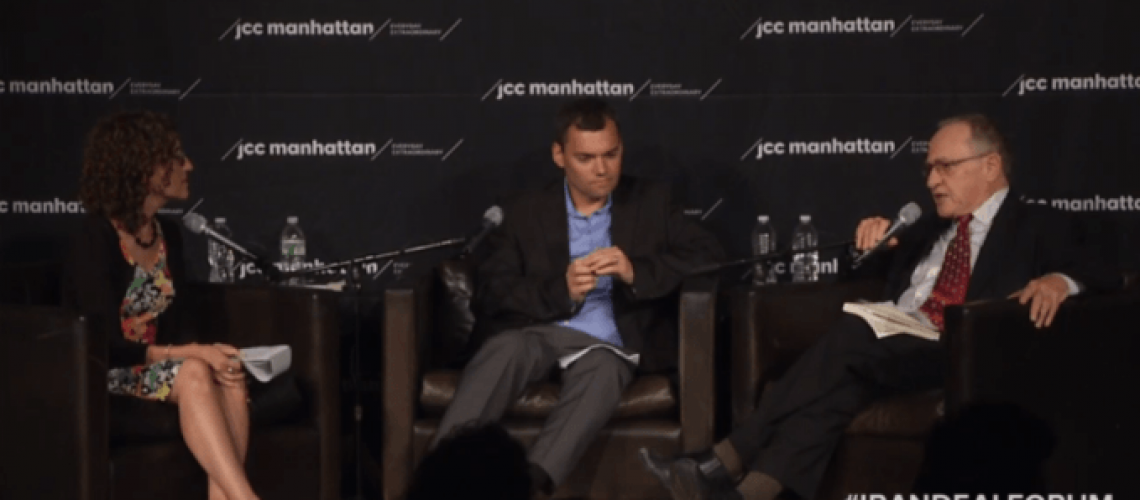Alan Dershowitz sees himself as very much a liberal. Even in terms of Israel, he touts the fact that he supports a two-state solution with the Palestinians and contends that expanding West Bank settlements are a bad idea. He has suffered for this with insults and heckling at least once, at a predominantly right-wing gathering organized by the Jerusalem Post in New York, two years ago.
 His overlarge ego dominated his debate with Peter Beinart (at the Manhattan JCC, Sept. 3) on the Iran nuclear agreement; but his arguments, in my view, did not prevail. Beinart listened with visible consternation as Dershowitz seemed to invent his own facts in attacking the Iran deal. By way of contrast, I’ve never heard Beinart argue more fluently and competently. Their major point of contention was in how thorough and prolonged are the agreement’s provisions to safeguard against an Iranian bomb. Dershowitz tends to argue by selectively quoting (or misquoting) Obama to the effect that it’s only a ten-year deal, rather than 15 to 25, with Iran’s commitment to sign the Nuclear Non-Proliferation Treaty binding it in perpetuity, according to Beinart.
His overlarge ego dominated his debate with Peter Beinart (at the Manhattan JCC, Sept. 3) on the Iran nuclear agreement; but his arguments, in my view, did not prevail. Beinart listened with visible consternation as Dershowitz seemed to invent his own facts in attacking the Iran deal. By way of contrast, I’ve never heard Beinart argue more fluently and competently. Their major point of contention was in how thorough and prolonged are the agreement’s provisions to safeguard against an Iranian bomb. Dershowitz tends to argue by selectively quoting (or misquoting) Obama to the effect that it’s only a ten-year deal, rather than 15 to 25, with Iran’s commitment to sign the Nuclear Non-Proliferation Treaty binding it in perpetuity, according to Beinart.
Dershowitz’s liberalism on Middle East issues is more theoretical than real. His instincts are to excuse if not support Israeli government actions. And so he made it clear that he sympathizes with Prime Minister Netanyahu in his highly public disputes with Pres. Obama.
And he revels in lawyerly arguments that distort the truth. One whopper in this event was his claim that Obama does not like “tough Jews,” alleging that Rahm Emanuel and Larry Summers were “fired” within six months. (You see, Netanyahu is also “one tough Jew”; get it?)
Actually, Emanuel served as Obama’s chief of staff for nearly two years, from January 20, 2009 – October 1, 2010. He left this high-pressure/high turnover job to pursue his ambition to become mayor of Chicago. As for Summers, he served as director of the National Economic Council for nearly one year, from January 20, 2009 – December 31, 2010.
The moderator, The Forward’s editor-in-chief Jane Eisner, brought out a contradiction in Dershowitz’s position on the Iran deal. Even in his new instant book against the agreement, she noted that he concedes that although a very bad deal in his view, the repercussions of defeating it now may make things worse. He argued against the notion that there was a contradiction, and later, in connection with Eisner’s attempt to rein in the discussion — so that the audience, seated together at tables, could submit their written questions and discuss the issue among themselves — rudely accused Eisner of being “an unfair moderator.”
Dershowitz also displayed a vendetta against J Street, accusing it of being “pro-Obama” rather than “pro-Israel” (a curious statement for a Democrat who claims to have voted for Obama twice). He has debated J Street’s president, Jeremy Ben-Ami, in the past, but despite his sharp disagreements — to the point of denunciation — complained that this organization has never invited him to denounce it in person at its national conferences.
As for the agreement itself, the details are complicated, especially insofar as various provisions sunset within 10, 15 and 25 year intervals. This makes for confusion and honest misinterpretation. Iran’s bad behaviors in the neighborhood, and its hostile rhetoric, especially regarding Israel and the United States (even ongoing after the agreement has been reached), guarantee heated debate.
A final note: Dershowitz styles himself as an expert on almost everything. A rich slice of his egotism was illustrated by his claim that every time he goes to Israel he’s invited to meet with defense and security officials to discuss strategy. Really? I’d be fascinated to learn what Israel’s military and security establishment learns from General Dershowitz.
Click HERE to watch the debate online

